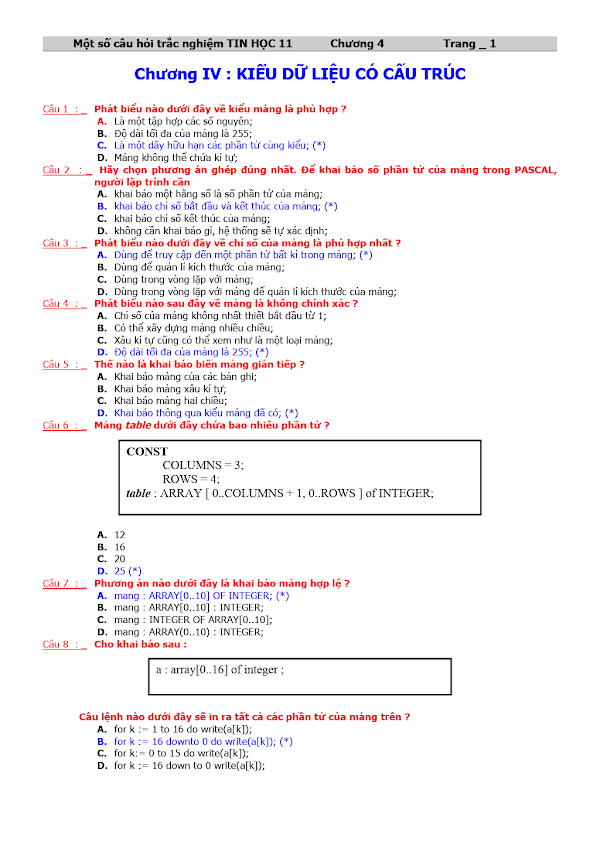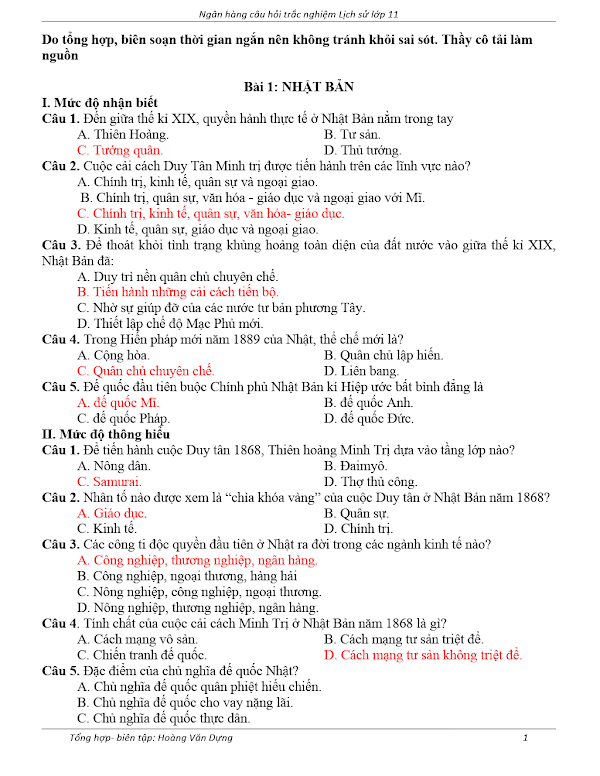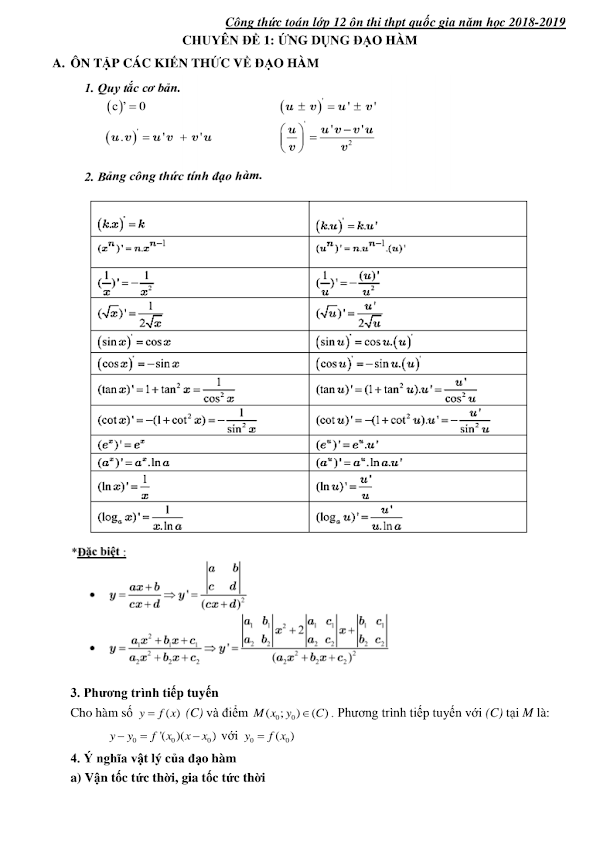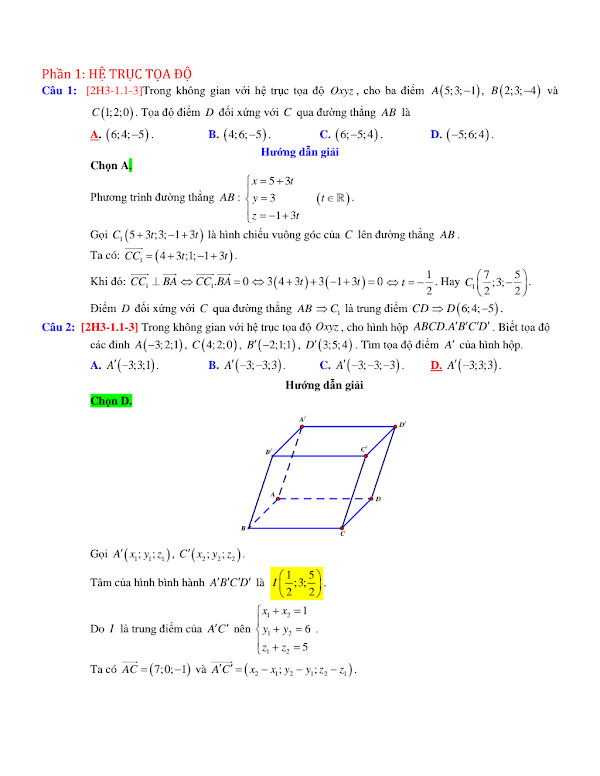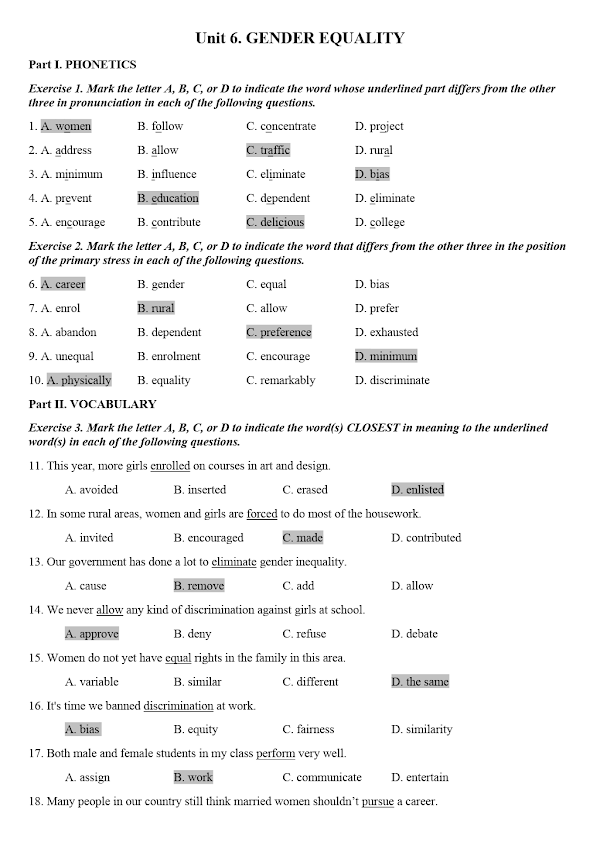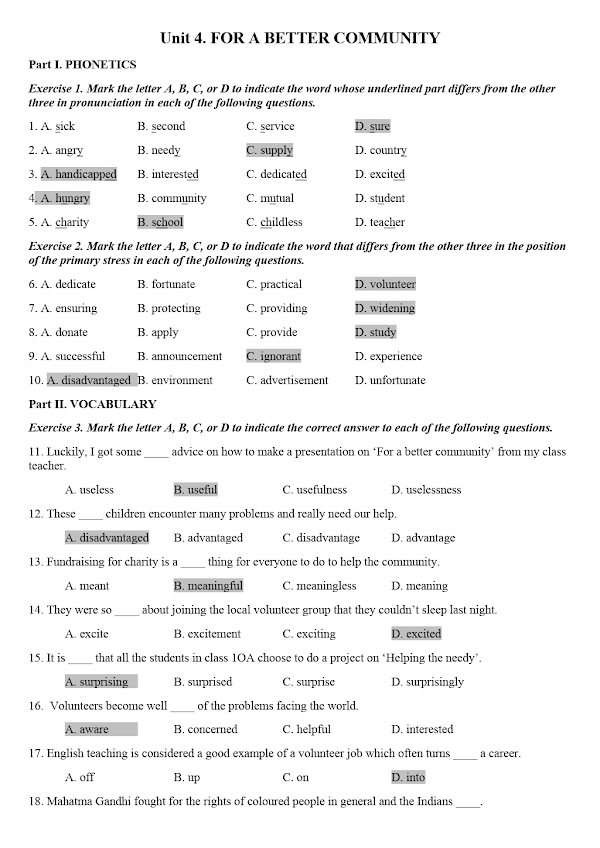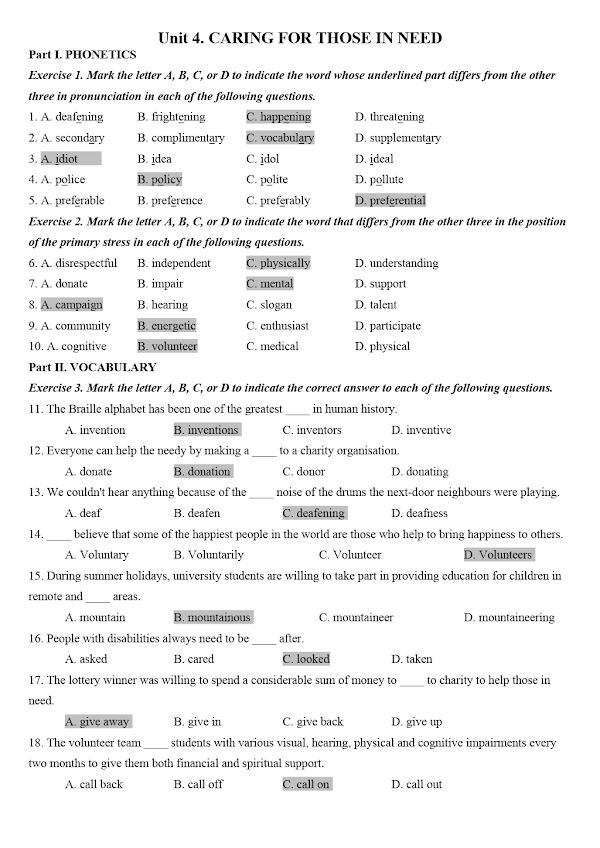Bài tập luyện tập Tiếng Anh lớp 10 - Unit 9: Preserving the environment
Chào các bạn học sinh và quý thầy cô, hôm nay LogaVN gửi tới bạn đọc tài liệu "Bài tập luyện tập Tiếng Anh lớp 10 - Unit 9: Preserving the environment". Hi vọng sẽ giúp ích cho các bạn học tập và giảng dạy.
Unit 9. PRESERVING THE ENVIRONMENT
Part I. PHONETICS
Exercise 1. Mark the letter A, B, C, or D to indicate the word that differs from the other three in position the of the primary stress in each of the following questions.
01. A. disposal B. animal C. energy D. poverty
02. A. awareness B. solution C. importance D. happiness
03. A. origin B. dependence C. harmony D. factory
04. A. replacement B. pollutant C. resident D. depletion
05. A. instrument B. engineer C. newsletter D. family
06. A. vehicle B. musical C. article D. reduction
07. A. consumption B. chemical C. neighborhood D. pesticide
08. A. scientist B. consequence C. detergent D. influence
09. A. erosion B. atmosphere C. resources D. confusion
10. A. volunteer B. charity C. vegetable D. injury
Part II. VOCABULARY
Exercise 2. Mark the letter A, B, C, or D to indicate the correct answer to each of the following questions.
11. If you ask me, _________ waste is a much bigger problem than ordinary household waste.
A. industrial B. business C. working D. manufacturing
12. Do you know what CFC_________?
A. sets in B. does up C. stands for D. gets down
13. There’s been a________ in Germany and a village was completely destroyed.
A. flood B. drizzle C. shower D. smog
14. Dinosaurs have been________ for millions of years.
A. endangered B. extinct C. threatened D. disappeared
15. As town grow, they tend to destroy the surrounding________ areas.
A. urban B. commercial C. land D. rural
NEW CURRICULUM TEXTBOOK-BASED PRACTICE TEST UNIT 9: PRESERVING THE ENVIRONMENT
Đỗ Bình – THPT Liễn Sơn, Lập Thạch, Vĩnh Phúc – HYPERLINK "http://www.violet.vn/quocbinh72" www.violet.vn/quocbinh72 Trang PAGE \* MERGEFORMAT 8
Unit 9. PRESERVING THE ENVIRONMENT
Part I. PHONETICS
Exercise 1. Mark the letter A, B, C, or D to indicate the word that differs from the other three in position the of the primary stress in each of the following questions.
01. A. disposal B. animal C. energy D. poverty
02. A. awareness B. solution C. importance D. happiness
03. A. origin B. dependence C. harmony D. factory
04. A. replacement B. pollutant C. resident D. depletion
05. A. instrument B. engineer C. newsletter D. family
06. A. vehicle B. musical C. article D. reduction
07. A. consumption B. chemical C. neighborhood D. pesticide
08. A. scientist B. consequence C. detergent D. influence
09. A. erosion B. atmosphere C. resources D. confusion
10. A. volunteer B. charity C. vegetable D. injury
Part II. VOCABULARY
Exercise 2. Mark the letter A, B, C, or D to indicate the correct answer to each of the following questions.
11. If you ask me, _________ waste is a much bigger problem than ordinary household waste.
A. industrial B. business C. working D. manufacturing
12. Do you know what CFC_________?
A. sets in B. does up C. stands for D. gets down
13. There’s been a________ in Germany and a village was completely destroyed.
A. flood B. drizzle C. shower D. smog
14. Dinosaurs have been________ for millions of years.
A. endangered B. extinct C. threatened D. disappeared
15. As town grow, they tend to destroy the surrounding________ areas.
A. urban B. commercial C. land D. rural
16. During the last hundred years we have done great________ to the environment.
A. injury B. pollution C. damage D. hurt
17. There are lots of things we can all do to________ the environment.
A. enhance B. protect C. make D. build
18. Environmentalists are furious with the American Government for delaying measures which will reduce greenhouse gas________.
A. exhaust fumes B. smokes C. wastes D. emissions
19. The government is introducing strict new rules on the dumping of________ by industry.
A. pesticides B. exhaust fumes. C. toxic waste D. emissions
20. Farmers contribute to environmental damage by spraying________ with________, which stay in the soil for years. A. agriculture – pesticides B. agriculture - fertilizers
C. crops – fertilizers D. crops - pesticides
21. The gradual rise in the Earth's temperature is known as________.
A. greenhouse effect B. global warming C. ozone layer D. acid rain
22. The________ that are produced by factories and cars are allowing more________ from the sun to reach carth. A. gases – radiation B. gases - light C. gas – light D. gas - radiation
23. As the Earth gets hotter, the Arctic and Antarctic________ will slowly melt and the level of the oceans will rise. A. snowballs B. avalanches C. ice caps D. icebergs
24. There will be________ , too. Some areas will become wetter while others will become much drier.
A. weather changes B. weather forecasts C. climatic changes D. climate changes
25. Thousands of acres of forest are being cut down every year and the________ of many animals are being destroyed.
A. natural resources B. natural habitats C. ways of life D. living surroundings
26. Many of the world's largest cities are________ and some are permanently covered by a________.
A. heavily polluted - polluted cloud B. heavy pollution - polluted cloud
C. heavy pollution - cloud of pollution D. heavily polluted - cloud of pollution
27. Make sure your car runs on unleaded petrol and your home uses sources of________ energy.
A. recycling B. reused C. renewable D. recyclable
28. Scientists have found holes in the________ , particularly over Antarctica.
A. ice caps B. polar ice C. ozone layer D. greenhouse
29. Greenpeace is an international group that protests against anything which is a________ to the environment. A. threat B. threaten C. threatening D. threatener
30. If government don't________ global warming, more natural disasters will occur.
A. achieve B. promote C. discourage D. prevent
31. There's has been a steady rise in the average temperature around the planet over the last hundred years or so, and the majority of scientists put it________ to human activity.
A. down B. back C. up D. across
32. However, some scientists argue that the historical evidence shows that over time the Earth heats________ and cools________ naturally.
A. up - away B. away - down C. up-down D. down - up
33. It is predicted that over the next few decades many species will die________ as once fertile areas turn to desert. A. off B. out С. up D. down
34. Most of the air pollution results________ the burning of fossil fuels, motor vehicles, factories, aircraft and rockets. A. in B. to C. on D. from
35. Environmental pollution is becoming an________ serious problem that needs to be taken care of as soon as possible.
A. increasingly B. increasing C. increase D. increased
Exercise 3. Mark the letter A, B, C, or D to indicate the word(s) CLOSEST in meaning to the underlined word(s) in each of the following questions.
36. We are facing severe environmental pollution despite the fact that many world organizations are working hard to reduce it.
A. heavy B. destructive C. harmful D. serious
37. Water pollution is a result of dumping pollutants such as detergents, pesticides, oil, and other chemicals in rivers, which makes the water unclean.
A. substances B. stuffs C. contaminants D. wastes
38. Stop the degradation of the planet's natural environment and build a future in which humans live in harmony with nature.
A. coexist peacefully with B. fall in love with C. agree with D. cooperate with
39. WWF was set up in 1961 and had its operations in areas such as the preservation of biological diversity. A. difference B. abundance C. variety D. plenty
40. The seashore was much polluted because of the amount of waste left there. All this rubbish is killing fish and other marine life.
A. sea plants B. sea mammals C. water life D. sea creatures
41. In 1986, the organization changed its name to World Wide Fund for Nature. However, it has operated under the original name in the US and Canada.
A. old B. former C. first D. ancient
42. Some of WWF's missions are: conserving the world's biological diversity, ensuring the use of renewable natural resources, and promoting the reduction of pollution.
A. jobs B. careers C. tasks D. actions
43. Air pollution is a consequence of fossil fuel burning by motor vehicles, factories, aircraft and rockets. A. product B. example C. harm D. result
44. The natural environment has been seriously influenced and degraded by human activities through many decades.
A. worsened B. damaged C. destroyed D. reduced
45. Global warming is the gradual increase of temperature on the Earth's surface due to greenhouse effect. A. steady B. slow C. sharp D. abrupt
Exercise 4. Mark the letter A, B, C, or D to indicate the word(s) OPPOSITE in meaning to the underlined word(s) in each of the following questions.
46. Fresh water is very important to life because no one can live without it. Yet it is one of the limited and most endangered natural resources on our planet.
A. Clean B. Drinkable C. Polluted D. Running
47. One way to protect our environment from pollution is to reduce wasteful consumption.
A. costly B. excessive C. safe D. economical
48. If you follow at least one of the tips, you can be proud of taking part in the preservation of water, one of the very important and limited natural resources on earth.
A. self-confident B. self-satisfied C. discontent D. unpleasant
49. Soil pollution leads to lack of fertile land to grow enough food for an increasing population.
A. arid B. rich C. unclean D. deserted
50. Global warming may lead to many negative changes, including harsher weather conditions.
A. more unbearable B. milder C. more extreme D. more scrious
Part III. GRAMMAR
Exercise 5. Mark the letter A, B, C, or D to indicate the correct answer to each of the following questions.
51. "I'm a big fan of U23.” Derek said. Derek said he_________ a big fan of U23.
A. was B. has been C. were D. had been
52. "We're watching TV," said the twins. The twins said they_________ TV.
A. watched B. were watching C. have been watching D. had watched
53. “You've been annoying me all day!" my mum said. My mum said I_________ her all day.
A. annoyed B. was annoying C. have been annoying D. had been annoying
54. "The dog ate my homework!” said Ivan. Ivan said the dog_________ his homework.
A. was eating B. has eaten C.ate D. had eaten
55. "At one o'clock, I was having lunch," said Molly. Molly said she_________ lunch at one o'clock.
A. had been having B. has had C. is having D. has been having
56. "You'll get wet without an umbrella," Dad said. Dad said I_________ wet without an umbrella.
A. will be getting B. got C. would be getting D. would get
57. "He can juggle five balls!" said Angie. Angie said he_________ five balls.
A. juggled B. had juggled C. would juggle D. could juggle
58. “You must give me your essays," Mrs Vine said. Mrs Vine said we_________ give her our essays.
A. were having to B. would have to C. had to D. must
59. “Could you pass me the salt, please?" I asked the man next to me.
Tasked the man next to me_________ me the salt.
A. pass B. if he passes C. to pass D. if he would pass
60. "Would you mind waiting for a moment?" the shop assistant asked the woman.
The shop assistant asked the woman_________ for a moment.
A. to wait B. waiting C. if she waits D. if she minds waiting
61. “Please don't leave your dirty football boots in the hall," Mum said to Doug.
Mum told Doug_________ dirty football boots in the hall.
A. that he doesn't leave his B. not to leave his C. not to leave your D. don't leave his
62. "Could you tell us where you were at six o'clock?" the police officer asked Barry.
The police officer asked Barry_________ had been at six o'clock.
A. telling him where you B. where he tells him he
C. to tell him where you D. to tell him where he
63. "Could I have your e-mail address?" I asked Mariella. I asked Mariella_________ e -mail address.
A. to give me her B. give me your C. give me her D. gave me your
64. "Can I have a new Xbox for my birthday?" I asked my mum.
I asked my mum_________ a new Xbox for my birthday.
A. that she gets me B. get me C. to get me D. if she could have me
65. "What's your name?" she asked me. She asked me_________ .
A. what your name is B. what your name was C. what my name is D. what my name was
66. "Are you a student?" the man asked the boy. The man wanted to know_________ .
A. if I was a student B. if the boy was a student
C. if I am a student D. if the boy is a student
67. "What school are you going to?" he asked me. He wanted to know_________.
A. what school am I going to B. what school you are going to
C. what was the school I go to D. what school I was going to
68. "I won't be home this evening because I have to work late," Mike said. Mike said that_________.
A. I wouldn't be home this evening because I had to work late
B. he wouldn't be home this evening because he had to work late
C. he won't be home this evening because he has to work late
D. he wouldn't be home that evening because he had to work late
69. "You can sit here," the stewardess said. The stewardess said_________.
A. you can sit here B. I could sit here C. I could sit there D. you could sit there
70. “Anna left here an hour ago," she said. She told me that_________.
A. Anna had left here an hour ago B. Anna had left there an hour ago
C. Anna had left here an hour before D. Anna had left there an hour before
71. "I don't want anything to eat now," he said. He said_________.
A. he doesn't want anything to eat now B. he didn't want anything to eat then
C. I didn't want anything to eat then D. I didn't want anything to eat now
72. “I've only had this new bicycle since yesterday," Karen said. Karen said that_________.
A. I had only had this new bicycle since yesterday
B. he had only had that new bicycle since the day before
C. I had only had this new bicycle since the day before
D. he's only had that new bicycle since the day before
73. "Don't waste water, Mum said to Mary. Mum told Mary_________.
A. that she doesn't waste water B. to waste water
C. don't waste water D. not to waste water
74. "You shouldn't use your cars for short distances, the teacher said.
The teacher advised her students_________.
A. that you shouldn't use your cars for short distances
B. not to use their cars for short distances
C. not to use your cars for short distances
D. not to use her cars for short distances
75. "I'll finish it by the end of this week," he said. He promised_________.
A. he'll finish it by the end of this week B. he would finish it by the end of this week
C. to finish it by the end of that week D. to finish it by the end of this week
76. "Don't forget to turn the tap off before you leave. " Grandma said.
Grandma reminded me_________.
A. to turn the tap off before I left B. turn the tap off before you left
C. don't forget to turn the tap off before I left D. to turn the tap off before you left
77. Dorothy asked him_________.Sarah was his sister.
A. that B. if C. what D. who
78. Tom and Henry asked me to go with_________.
A. him B. their C. them D. they
79. I asked Martha ____ to join the Green Club.
A. whether she is planning B. if she was planning
C. when was she planning D. where she was planning
80. Bob wanted to know when_________.
A. will the exam be taken B. the exam will be taken
C. would the exam be taken D. the exam would be taken
Exercise 6. Mark the letter A, B, C. or D to indicate the underlined part that needs correction in each of the following questions.
81. Tim called yesterday and said he needed the report right now.
A B C D
82. Sally called from Miami and said that she was swimming here.
A B C D
83. They complained that there isn't any fresh water in the local area.
A B C D
84. Rosy said that she will come back there on another project the following year.
A B C D
85. Tony promised that he would do his homework today.
A B C D
86. Clarence said he couldn't have repaired the car the next day.
A B C D
87. Mr Jones told his children not to wasting fresh water.
A B C D
88. The teacher asked his students to focus on your topic.
A B C D
89. Sally suggested to go to school by bicycle in order to save energy.
A B C D
90. Harry offered lending a hand with keeping the school environment clean.
A B C D
Part IV. SPEAKING
Exercise 7. Mark the letter A, B, C, or D to indicate the correct response to each of the following exchanges.
91. "Why don't we have a look at some websites for more information about the environment?" – "____________”
A. Yes, thanks. B. Yes, why not? C. It's my pleasure. D. Do we?
92. "____________" - "By bus."
A. What did you take to get there? B. Did you get there by motorbike?
C. How long did it take you to get there? D. How did you get there?
93. "Hi, Jack. "____________” - "Not bad. And you?"
A. How's everything? B. What's everything? C. What do you do? D. How do you do?
94. "____________”- "That's a good idea."
A. What about recycling water for gardening? B. Sorry, can I say something?
C. Glad to work with you. D. Excuse me, I want to add something.
95. "Shall I empty the dustbin?" – "____________”
A. Make yourself at home. B. Nice to meet you!
C. It's very nice of you to do so. D. Long time no see.
96. "Can I borrow your notes, please?" – "____________”
A. Well done! B. No, thanks. C. Yes, sure. D. Yes, I can.
97. "Would you like to join this Green Project with us?" - "____________”
A. Yes, I would B. Why not? C. I'd love to D. It doesn't matter.
98. "Where should we start with the project?" – "____________”
A. I never mind. B. I'm glad to hear that.
C. Oh, that would be great. D. What about searching the webs?
99. "Hi, John. Congratulations!" – "____________”
A. I'm sorry. B. Thank you. C. My pleasure. D. You're welcome.
100."Excuse me! Where is the recycling center?" – "____________”
A. Let me see. B. I'm not sure. C. Hold on, please. D. It's over there.
101. Thanks for doing that." - "____________”
A. It's my pleasure B. Don't say that. C. Not at all. D. It's nice of you
102. "How long will the meeting last?" – "____________”
A. Half past ten. B. Since early morning.
C. Once a week, usually. D. An hour or so, I expect.
103. "____________” - "I'm going to make a table."
A. Why is this recycled wood used? B. How is this recycled wood used?
C. What's this recycled wood for? D. Whose is this recycled wood?
104. "____________” - "It was very sunny and hot. We had a bit of a heatwave.
A. Did you enjoy your holiday? B. How was the wave?
C. What was the weather like there? D. How was the beach?
105. "Could you do me a favor, please?" – "____________”
A. Let me help you. B. Sure. What can I do for you?
C. No, thanks. I'm fine. D. Yes, go ahead!
Part V. READING
Exercise 8. Read the following passage and mark the letter A, B, C, or correct word that best fits each of the numbered blanks.
GLOBAL WARMING
Few people now question the reality of global warming and its effects on the world's climate. Many scientists (106)_______ the blame for recent natural disasters on the increase in the world's temperatures and are convinced that, more than (107)_______ before, the Earth is at (108)_______ from the forces of the wind, rain and sun. (109)_______ to them, global warming is making extreme weather events, such as hurricanes and droughts, even more (110)_______ and causing sea levels all around the world to (111)_______.
Environmental groups are putting (112)_______ on governments to take actions to reduce the amount of carbon dioxide which is given (113)_______ by factories and power plants, thus attacking the problems at its source. They are in (114)_______ of more money being spent on research into solar, wind and wave energy devices, which could then replace existing power (115)_______.Some scientists, (116)_______, believe that even if we stopped releasing carbon dioxide and other gasses into the atmosphere tomorrow, we would have to wait (117)_______ hundred years to notice the results. Global warming, it seems, is here to stay.
106. A. give B. put C. take D. have
107. A. yet B. never C. once D. ever
108. A. threat B. danger C. risk D. harm
109. A. Concerning B. Regarding C. Depending D. According
110. A. strict B. severe C. strong D. heavy
111. A. raise B. arise C. rise D. lift
112. A. force B. pressure C. persuasion D. encouragement
113. A. off B. away C. up D. over
114. A. belief B. request C. favor D. suggestion
115. A. factories B. generations C. houses D. stations
116. A. but B. although C. despite D. however
117. A. several B. over C. numerous D. various
Exercise 9. Read the following passage and mark the letter A, B, C, or D to indicate the correct answer to each of the questions.
THINK BEFORE YOU TOSS
Countries around the world have growing mountains of trash because people are throwing out more trash than ever before. How did we become a throwaway society?
First of all, it is now easier to replace an item than to spend time and money to repair it. Thanks to modern manufacturing and technology, companies are able to produce items

